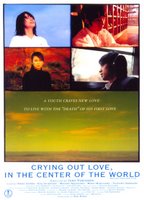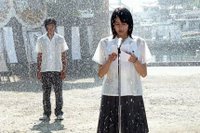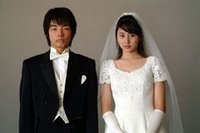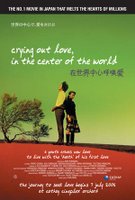 Given my bad experience with Raam, I was quite happy to find the Japanese movie Crying out Love, in the Centre of the World (a.k.a. Socrates in Love a.k.a. Sekai no Chushin de, Ai wo Sakebu) in the filmfest lineup. For one, I've heard about this movie before, and I have a feeling it's good. Second, being a Japanese movie, it definitely should come with subtitles. I got to the cinema 10 minutes early, and it's half-full already. Looking good. Five minutes before showtime, the movie started playing. The lady who sat beside me arrived on time, and she was not happy that the movie started without her.
Given my bad experience with Raam, I was quite happy to find the Japanese movie Crying out Love, in the Centre of the World (a.k.a. Socrates in Love a.k.a. Sekai no Chushin de, Ai wo Sakebu) in the filmfest lineup. For one, I've heard about this movie before, and I have a feeling it's good. Second, being a Japanese movie, it definitely should come with subtitles. I got to the cinema 10 minutes early, and it's half-full already. Looking good. Five minutes before showtime, the movie started playing. The lady who sat beside me arrived on time, and she was not happy that the movie started without her. I was not a happy camper, too. The lights were left on, there were no subtitles, and the screen size was wrong. The sides of the screen was squeezed such that all the actors look impossibly tall and thin, like manga characters. On screen were these schoolgirls with their super short skirts and incredibly longs legs, and I go this is so wrong. I was so frustrated that for a few seconds I have a mind to go up to the projector room and set things straight. The funny thing is, I was looking around the cinema, and nobody else seem to be bothered.
I was not a happy camper, too. The lights were left on, there were no subtitles, and the screen size was wrong. The sides of the screen was squeezed such that all the actors look impossibly tall and thin, like manga characters. On screen were these schoolgirls with their super short skirts and incredibly longs legs, and I go this is so wrong. I was so frustrated that for a few seconds I have a mind to go up to the projector room and set things straight. The funny thing is, I was looking around the cinema, and nobody else seem to be bothered.  Am I the only one who doesn't Nihongo in downtown KL? Fortunately, someone fixed up the projector half an hour into the movie. The actors went back to their regular size and height, and now that the screen is expanded, we can also see the subtitles. Half of the subtitles, to be precise, as the screen is still not centered properly. Better than nothing, though.
Am I the only one who doesn't Nihongo in downtown KL? Fortunately, someone fixed up the projector half an hour into the movie. The actors went back to their regular size and height, and now that the screen is expanded, we can also see the subtitles. Half of the subtitles, to be precise, as the screen is still not centered properly. Better than nothing, though.Back to the movie. As with most Japanese movies I've watched, Crying out Love, in the Center of the World is quite good - unique plot and winning performances from the actors.
 It's a tale of tragic romance exploring the theme of undying love. The film stars Takao Osawa as Sakutaro Matsumoto, engaged to the beautiful Ritsuko Fujimura (played by Kou Shibasaki). While packing for a move, Ritsuko discovers a cassette tape. (Yes, they have cassette tapes back then.) She runs out of the house, buys a Walkman from a store, listens to the tape, starts crying, and goes AWOL from Sakutaro. She leaves him a note, "I'm going away for awhile. Don't worry about me."
It's a tale of tragic romance exploring the theme of undying love. The film stars Takao Osawa as Sakutaro Matsumoto, engaged to the beautiful Ritsuko Fujimura (played by Kou Shibasaki). While packing for a move, Ritsuko discovers a cassette tape. (Yes, they have cassette tapes back then.) She runs out of the house, buys a Walkman from a store, listens to the tape, starts crying, and goes AWOL from Sakutaro. She leaves him a note, "I'm going away for awhile. Don't worry about me."Dazed and confused, Sakutaro heads to the bar for a drink.
 There he sees his fiancee hobbling around in the background during a live TV report in Takamatsu Airport. The location sparks some old memories in him, and we are transported back to 1986 (17 years ago), where the real story started. We see young "Saku" (played by Mirai Moriyama) becoming very close friends with the beautiful and intelligent Aki Hirose (Masami Nagasawa). For some reason, the two decided to have a contest as to whose dedication will be played first on a radio station.
There he sees his fiancee hobbling around in the background during a live TV report in Takamatsu Airport. The location sparks some old memories in him, and we are transported back to 1986 (17 years ago), where the real story started. We see young "Saku" (played by Mirai Moriyama) becoming very close friends with the beautiful and intelligent Aki Hirose (Masami Nagasawa). For some reason, the two decided to have a contest as to whose dedication will be played first on a radio station.  Winner gets a Sony Walkman from the station. (Wow.) Saku eventually won the contest by making a dedication to his imaginary leukemia-stricken classmate, much to Aki's distress. Too offended to talk to Saku again, Aki expresses her thoughts and feelings through a cassette recording that she hands to Saku. So the two starts exchanging tapes back and forth - telling each other stories, asking each other questions, getting to know each other better, etc.
Winner gets a Sony Walkman from the station. (Wow.) Saku eventually won the contest by making a dedication to his imaginary leukemia-stricken classmate, much to Aki's distress. Too offended to talk to Saku again, Aki expresses her thoughts and feelings through a cassette recording that she hands to Saku. So the two starts exchanging tapes back and forth - telling each other stories, asking each other questions, getting to know each other better, etc. Everything seems to be going well, until Ako suddenly loses consciousness during their out-of-town trip. She was rushed to the hospital where the doctors declare she has leukemia (of all diseases). Imagine Saku's guilt and remorse. To brighten up her spirits, Saku promises to bring her to Uluru, which she calls the center of the world,a place they've only seen in pictures. As their planned trip approaches, Aki becomes weaker. The medical treatments left her bald, but boy, does she look as beautiful as ever. Will the two lovebirds make it to Uluru to see The Rock?
Everything seems to be going well, until Ako suddenly loses consciousness during their out-of-town trip. She was rushed to the hospital where the doctors declare she has leukemia (of all diseases). Imagine Saku's guilt and remorse. To brighten up her spirits, Saku promises to bring her to Uluru, which she calls the center of the world,a place they've only seen in pictures. As their planned trip approaches, Aki becomes weaker. The medical treatments left her bald, but boy, does she look as beautiful as ever. Will the two lovebirds make it to Uluru to see The Rock?  Will they have a happily ever after? What's Ritsuko's role in all of this, and why is she limping? How does being No. 2 feel? What has the impending typhoon got to do with the movie?
Will they have a happily ever after? What's Ritsuko's role in all of this, and why is she limping? How does being No. 2 feel? What has the impending typhoon got to do with the movie?The thing that makes a good movie is that every single detail contributes something to the story, and this is one of those movies. It's a bit long at 138 minutes, so I won't tell all here. Fans of Korean tearjerkers are in for a treat, as this movie has lots of them:
- The scene where Saku goes to the hospital to visit Aki, and sees her bald for the first time. He has a slight pained expression on his face, and leaves without a word. Everyone was thinking - aww, you shallow man. After a few days, he comes back to the hospital, and hands a marriage contract to Aki. "Let's get married." Aww, pass me the Kleenex, will you?
- The scene at the old school gym, where the present-day Sakutaro is listening to one of Aki's tapes and reminiscing. Aki guides him around the gym, up the stage, right in front of the piano, where she asks him to close his eyes and listen to her play a song for him. Something she never did for anyone else, she adds. After finishing the piece, the young Aki comes up to the thirtysomething Sakutaro and hugs him tight. More Kleenex, please.
- The scene at the airport where the young Saku and Aki are waiting for their flight to Australia. Outside, a strong typhoon is blowing. Their flight got cancelled, and Saku went berserk. In the middle of the commotion, the gaunt and weak Aki slumps down to the floor, and Saku cries out pitifully for help, while everyone in the terminal stands around in shock. What do you mean we've run out of Kleenex?!
No comments:
Post a Comment